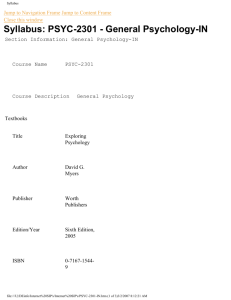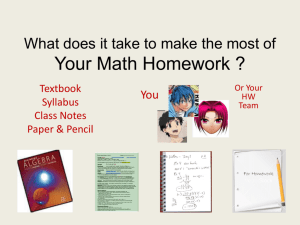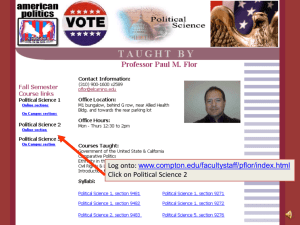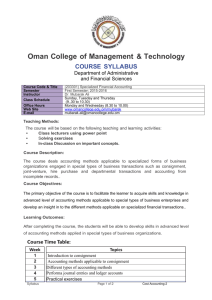Creating Productive Relationships MGMT 402 Summer 2013
advertisement
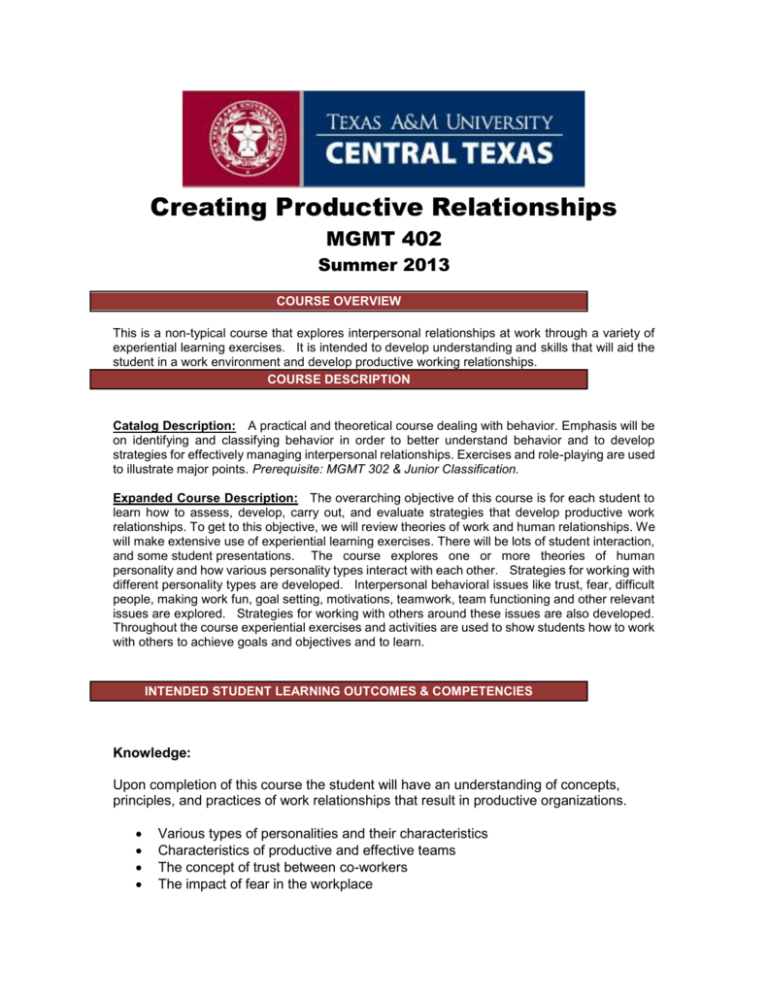
Creating Productive Relationships MGMT 402 Summer 2013 COURSE OVERVIEW This is a non-typical course that explores interpersonal relationships at work through a variety of experiential learning exercises. It is intended to develop understanding and skills that will aid the student in a work environment and develop productive working relationships. COURSE DESCRIPTION Catalog Description: A practical and theoretical course dealing with behavior. Emphasis will be on identifying and classifying behavior in order to better understand behavior and to develop strategies for effectively managing interpersonal relationships. Exercises and role-playing are used to illustrate major points. Prerequisite: MGMT 302 & Junior Classification. Expanded Course Description: The overarching objective of this course is for each student to learn how to assess, develop, carry out, and evaluate strategies that develop productive work relationships. To get to this objective, we will review theories of work and human relationships. We will make extensive use of experiential learning exercises. There will be lots of student interaction, and some student presentations. The course explores one or more theories of human personality and how various personality types interact with each other. Strategies for working with different personality types are developed. Interpersonal behavioral issues like trust, fear, difficult people, making work fun, goal setting, motivations, teamwork, team functioning and other relevant issues are explored. Strategies for working with others around these issues are also developed. Throughout the course experiential exercises and activities are used to show students how to work with others to achieve goals and objectives and to learn. INTENDED STUDENT LEARNING OUTCOMES & COMPETENCIES Knowledge: Upon completion of this course the student will have an understanding of concepts, principles, and practices of work relationships that result in productive organizations. Various types of personalities and their characteristics Characteristics of productive and effective teams The concept of trust between co-workers The impact of fear in the workplace MGMT 402 Syllabus The use of fun to enhance effective working together Procedures and techniques for dealing with difficult people Skill Upon completion of this course the student will have developed basic skills in or be able to: Apply concepts, skills and processes through participation in various behavioral & relationship related activities. Recognition of the personality type of others Applying appropriate strategies for working with different personality types Teamwork Trust building Using fun and humor to enhance the work environment Applying appropriate strategies for dealing with difficult persons. Setting goals with fellow workers Developing working relationships #INSTRUCTIONAL MATERIALS & SUPPORT RESOURCES Required Course Materials Bolton, Robert and Dorothy Bolton (1996). People Styles at Work: Making Bad Relationships Good and Good Relationships Better. New York, American Management Assn. ISBN 0-8144-7723-2. (Required). Covey, Stephen R. (1989). The Seven Habits of Highly Effective People. New York, Free Press. 0-671-70863-5. Lloyd, Ken (1999). Jerks at Work: How to Deal with People Problems and Problem People. Franklin Lakes, NJ, Career Press. ISBN 1-56414-396-1. (Required). Reina, Dennis and Michelle L. Reina (1999). Trust & Betrayal in the Workplace: Building Effective Relationship in Your Organization. San Francisco, Berrett-Koehler, Publishers. ISBN 1576750701. (Required). There is also a paperback version printed in Jan 06 that will work. Yerkes, Lesile (2001). Fun Works: Creating Places Where People Love to Work. San Francisco, Berrett-Koehler, Publishers ISBN 1-57675-154-6. (Required) 2 MGMT 402 Syllabus YOUR INSTRUCTOR Name: Mr. James Bondi Office Admins.: Charlotte Wesley Phone: (254) 519-5762 Email: cwesley@ct.tamus.edu Shawn Kelley Phone: (254) 519-5725 Email: s.kelley@ct.tamus.edu Home Phone: 254-291-0646 (Killeen, TX) E-mail Address: James.bondi@ct.tamus.edu Office Hours: Usually before or after class. EXAMS Two exams will be administered during the semester as indicated on the last page of the syllabus. Exams represent the independent work of students; teamwork will not be permitted. Exams will be administered through BLACKBOARD. ACADEMIC HONESTY# Texas A&M University - Central Texas expects all students to maintain high standards of personal and scholarly conduct. Students guilty of academic dishonestly are subject to disciplinary action. Academic dishonesty includes, but is not limited to, cheating on an examination or other academic work, plagiarism, collusion (working together), and the abuse of resource materials, including faculty designated resources. The faculty member is responsible for initiating action for each case of academic dishonestly. More information can be found at www.ct.tamus.edu/StudentConduct. DROP POLICY If you discover that you need to drop this class, you must go to the Records Office and ask for the necessary paperwork. Professors cannot drop students; this is always the responsibility of the 3 MGMT 402 Syllabus student. The record’s office will give a deadline for which the form must be returned, completed, and signed. Once you return the signed form to the records office and wait 24 hours, you must go into DuckTrax and confirm that you are no longer enrolled. If you are still enrolled, you should FOLLOW-UP with the records office immediately. You are to attend class until the procedure is complete to avoid penalty for absence. Should you miss the deadline or fail to follow the procedure, you will receive an F in the course. LIBRARY SERVICES INFORMATION LITERACY focuses on research skills which prepare individuals to live and work in an information-centered society. Librarians will work with students in the development of critical reasoning, ethical use of information, and the appropriate use of secondary research techniques. Help may include, yet is not limited to: exploration of information resources such as library collections and services, identification of subject databases and scholarly journals, and execution of effective search strategies. Library Resources are outlined and accessed at. http://www.tarleton.edu/centraltexas/departments/library/ STUDENTS WITH DISABILITIES:# Texas A&M University – Central Texas complies with Section 504 of the Rehabilitation Act of 1973 and the Americans with Disabilities Act of 1990. TAMUCT promotes the use of the Principles of Universal Design to ensure that course design and activities are accessible to the greatest extent possible. Students who require reasonable accommodations based on the impact of a disability should contact Gail Johnson, Disability Support Coordinator at (254) 501-5831 in Student Affairs, Office 114E. The Disability Support Coordinator is responsible for reviewing documentation provided by students requesting accommodations, determining eligibility for accommodations, helping students request and use accommodations, and coordinating accommodations. #YOUR RESPONSIBILITIES FOR YOUR LEARNING OUTCOMES Each student is responsible for his/her own learning outcomes. #SPECIFIC GUIDELINES FOR WRITTEN LEARNING OPPORTUNITIES (1) Quality Work: All work submitted for grading shall be of graduate level quality: Depth of analysis, grammatical structure, etc. (2) Identifying Submissions: Submissions must clearly identify the student and the title of the assignment. (3) Submission Style Requirements: Submissions will be in accordance with The Publication Manual of the American Psychological Association, 5 th ed., will be used as reference regarding format issues. 4 MGMT 402 Syllabus (4) Non-compliance: Submissions that fail to comply with the above will receive no more than half credit. (5) Late Submissions/Resubmissions: Cases and other assignments that are submitted late will receive no more than half credit. Resubmissions will not be accepted. #E-MAIL GUIDELINES E-Mail Address: Use my TAMUCT e-mail address for all e-mail correspondence. James.bondi@ct.tamus.edu Identification: For course related messages identify them with MGMT 402 and your name in the subject line. Response: I will endeavor to response to your message within 48 hours. PROJECTS & ASSIGNMENTS Team Member Performance: Students will be formed into teams for the various Exercises that are integral to the course. Students are expected to fully carry their load during these exercises. Research Activity and Presentation: Students will work in teams of two or three to present a 15 minute briefing on an assigned topic directly related to the development of effective work relationships. The research and presentation will be based one of The Seven Habits of Highly Effective People. This is considered to be a business/professional briefing, and students are advised that neatness and poise are considered in the grading process. Although students may wear BDU for this presentation, athletic clothing is not considered to be appropriate dress. Also, remember that time is important and points will be deducted for short or long presentations. CLASS POLICIES Classroom Policies a. Men shall not wear caps in the classroom. b. Cell phones and pagers shall be OFF. c. Laptop computers and recording devices may be used consistent with Ft Hood Education Services policies, No internet or wireless connections are permitted. d. No food or drink is allowed in Ft Hood classrooms. Water in enclosed plastic bottles is permitted. Individual Participation: Regular participation is expected. Reading assignments will be in accordance with this syllabus and as assigned in class. It is important for students to become familiar with materials/assignments prior to scheduled class session. Lectures are generally based on text readings and current issues. Preparation for discussion will have a major impact on credit awarded for participation; late assignments will be downgraded 10% per day, unless otherwise approved by the professor. Assignments are expected to be completed by the individual student as independent work. Changes to Syllabus: This syllabus serves as an instructional and study planning document. Although every effort will be made to maintain the schedule and activities presented herein, it may become necessary during the course of the semester to make changes to the syllabus. In such events, changes will be announced and students will receive written notice within one week of the change decision. #GRADE COMPUTATION 5 MGMT 402 Syllabus Course Element Percent of Course Grade Mid-Term Exam Point Grade 40% Final Exam Point Grade 40% In-Class Exercises Letter Grade 20% Total 100% Grade Equivalents: If Grade is Computed Numerically If Grade is Computed by Letter 90.0 - 100 % =A A= 95% 80.0 - 89.9% =B B= 85% 70.0 – 79.9% =C C= 75% 60.0 – 69.9% =D D= 65% 0 – 59.9% =F F= 0% COURSE SCHEDULE Week Dates 1 Jun 5 2 Jun 10-12 3 Reading Assignment Topic Course Orientation Kersey-Bates Personality Types Course Orientation Administer K-B. Covey H-1, Bolton P-1, Teams & Teamwork Habit 1, Understanding People Teambuilding exercises Jun 17-19 Covey H-2, Bolton P-2, Habit 2, Style Flex: the key to productive relationships. Teambuilding exercises 4 Jun 24-26 Covey H-3, Lloyd 1-9 Habit 3, Jerks Team exercises 5 Jul 1-3 Covey H-4, Lloyd 10-19 Habit 4 Jerks Mid-Term Exam 6 Jul 8-10 Covey H-5, Reina 1-5. Habit 5 Understanding Trust & Betrayal. Team exercises 7 Jul 15-17 Covey H-6, Reina 6-11 Habit 6, Understanding Transactional and Transformative Trust. Trust games 6 MGMT 402 Syllabus 8 Jul 22-24 Covey H-7, Habit 7, Penny Toss Exercise Penny Toss Exercise Final Exam 7


